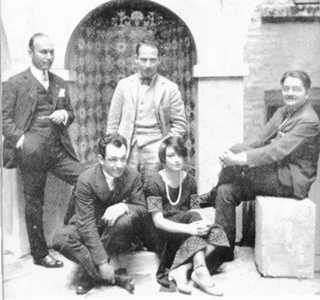 W
WThe Algonquin Round Table was a group of New York City writers, critics, actors, and wits. Gathering initially as part of a practical joke, members of "The Vicious Circle", as they dubbed themselves, met for lunch each day at the Algonquin Hotel from 1919 until roughly 1929. At these luncheons they engaged in wisecracks, wordplay, and witticisms that, through the newspaper columns of Round Table members, were disseminated across the country.
 W
WThe Bloomsbury Group—or Bloomsbury Set—was a group of associated English writers, intellectuals, philosophers and artists in the first half of the 20th century, including Virginia Woolf, John Maynard Keynes, E. M. Forster and Lytton Strachey. This loose collective of friends and relatives was closely associated with the University of Cambridge for the men and King's College London for the women, and they lived, worked or studied together near Bloomsbury, London. According to Ian Ousby, "although its members denied being a group in any formal sense, they were united by an abiding belief in the importance of the arts." Their works and outlook deeply influenced literature, aesthetics, criticism, and economics as well as modern attitudes towards feminism, pacifism, and sexuality. A well-known quote, attributed to Dorothy Parker, is "they lived in squares, painted in circles and loved in triangles".
 W
WBudh Sabha is a weekly literary workshop on Gujarati poetry held on every Wednesday since 1932. It is currently presided by writer Dhiru Parikh and held at Gujarati Sahitya Parishad, Ahmedabad.
 W
WThe Castalian Band is a modern name given to a grouping of Scottish Jacobean poets, or makars, which is said to have flourished between the 1580s and early 1590s in the court of James VI and consciously modelled on the French example of the Pléiade. Its name is derived from the classical term Castalian Spring, a symbol for poetic inspiration. The name has often been claimed as that which the King used to refer to the group, as in lines from one of his own poems, an epitaph on his friend Alexander Montgomerie:
 W
WThe Göttinger Hainbund was a German literary group in the late 18th century, nature-loving and classified as part of the Sturm und Drang movement.
 W
WHighfield was a large house situated at 128 Selly Park Road in the Selly Park area of Birmingham, England. Built in the 1860s, it was bought in 1929 by Philip Sargant Florence and his wife Lella Secor Florence after Sargant Florence was appointed as a Professor at the nearby University of Birmingham.
 W
WLife's Vanquished is the name by which became known an informal group of intellectuals of great relevance to Portuguese cultural life in the last three decades of the 19th century. Among the Vanquished were some of the writers, politicians, and aristocrats that had strived to modernise the country in their youths during the Regeneration — and whose perceived failure had led them to channel their disenchantment into an elegant and ironic decadent dilettantism.
 W
WA literary circle is a small group of students who gather together to discuss a piece of literature in depth.
 W
WHoward Phillips Lovecraft was an American writer of weird, science, fantasy, and horror fiction. Lovecraft is best known for his creation of a body of work that became known as the Cthulhu Mythos.
 W
WThe Mermaid Tavern was a tavern on Cheapside in London during the Elizabethan era, located east of St. Paul's Cathedral on the corner of Friday Street and Bread Street. It was the site of the so-called "Fraternity of Sireniacal Gentlemen", a drinking club that met on the first Friday of every month that included some of the Elizabethan era's leading literary figures, among them Ben Jonson, John Donne, John Fletcher and Francis Beaumont, Thomas Coryat, John Selden, Robert Bruce Cotton, Richard Carew, Richard Martin, and William Strachey. A popular tradition has grown up that the group included William Shakespeare, although most scholars think that was improbable.
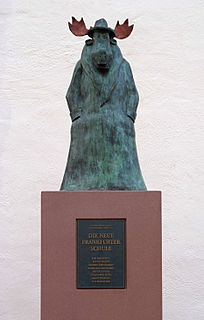 W
WNeue Frankfurter Schule is a group of writers and artists which was founded by former members of the editorial staff of the satirical magazine pardon. They have published the magazine Titanic from 1979.
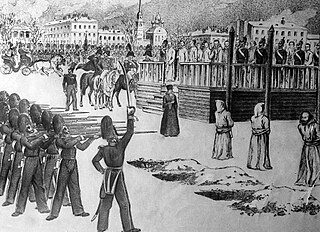 W
WThe Petrashevsky Circle was a Russian literary discussion group of progressive-minded intellectuals in St. Petersburg in the 1840s. It was organized by Mikhail Petrashevsky, a follower of the French utopian socialist Charles Fourier. Among the members were writers, teachers, students, minor government officials and army officers. While differing in political views, most of them were opponents of the tsarist autocracy and Russian serfdom. Like that of the Lyubomudry group founded earlier in the century, the purpose of the circle was to discuss Western philosophy and literature that was officially banned by the Imperial government of Tsar Nicholas I. Among those connected to the circle were the writers Dostoevsky and Saltykov-Shchedrin, and the poets Aleksey Pleshcheyev, Apollon Maikov, and Taras Shevchenko.
 W
WThe Serapion Brethren is the name of a literary and social circle, formed in Berlin in 1818 by the German romantic writer E. T. A. Hoffmann and several of his friends. The Serapion Brethren also is the title of a four-volume collection of Hoffmann's novellas and fairytales that appeared in 1819, 1820, and 1821.
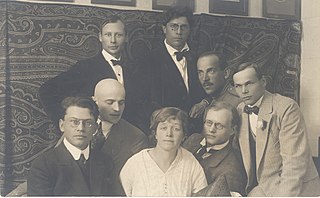 W
WThe Siuru literary movement, named after a fire-bird in Finnic mythology, was founded in 1917 in Estonia. It was an expressionistic and neo-romantic movement that ran counter to the Young Estonia formalist tradition.
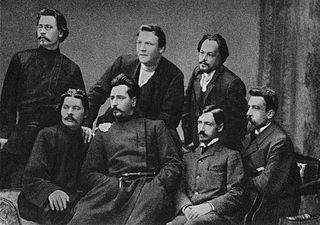 W
WThe Moscow Literary Sreda was a Moscow literary group founded in 1899 by Nikolai Teleshov. The name Sreda means Wednesday, taken from the day of the week on which writers and other artists met at Teleshov's home. The last meeting of the Sreda took place in 1916.
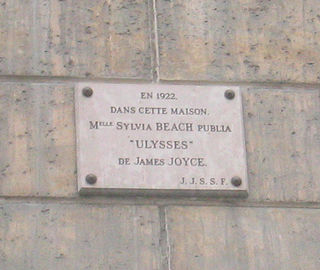 W
WStratford-on-Odéon was both a literary circle and James Joyce's affectionate nickname for the Rue de l'Odéon in Paris's Left Bank, its two bookstores and the "coterie of emergent Anglophone writers surrounding them".
 W
WThe Third Generation of Nigeria Writers is an emerging phase in Nigerian literature, in which there became a major shift in the method of publishing. This set of writers are known for writing post-independence novels and poems. These generation is believed to be influenced to be influenced by the western world, politics and the generations of Chinua Achebe. The emergence of the third generation of Nigerian writers has changed the publishing sector with a resurgence of new publishing firms such as Kachifo Limited, Parrésia Publishers, Cassava Republic Press amongst others. These new set of writers create new genres and themes as racism, class, abuse and violence.
 W
WThe Vigilantes was a twentieth-century American publishing syndicate. Their pamphlets and newspapers were distributed with the intention of inspiring patriotism and Allied involvement in World War I. The membership was largely composed of men, who dominated its leadership, though much of the content was produced by women and appeared pseudonymously as the work of "the Vigilantes". A contemporary review noted the "breathless cries of song wrung mostly from the hearts of our women."
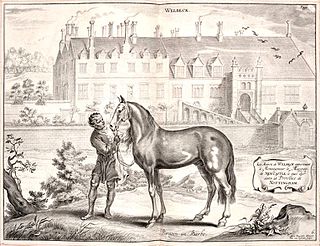 W
WThe Welbeck Academy or Welbeck Circle is a name that has been given to the loose intellectual grouping around William Cavendish, 1st Duke of Newcastle-upon-Tyne in the first half of the 17th century. It takes its name from Welbeck Abbey, a country house in Nottinghamshire that was a Cavendish family seat. Another term used is Newcastle Circle. The geographical connection is, however, more notional than real; and these terms have been regarded also as somewhat misleading. Cavendish was Viscount Mansfield in 1620, and moved up the noble ranks to Duke, step by step; "Newcastle" applies by 1628.